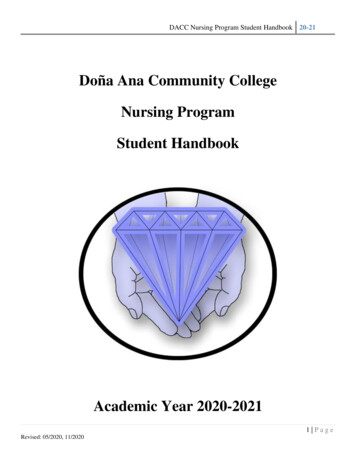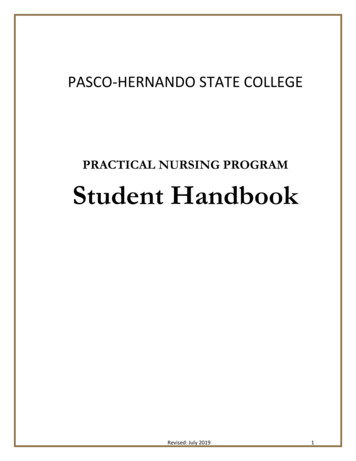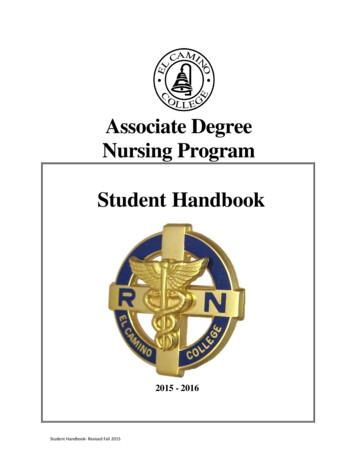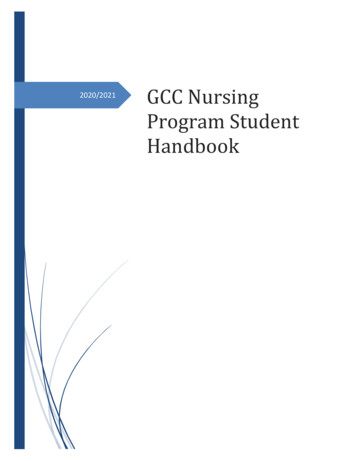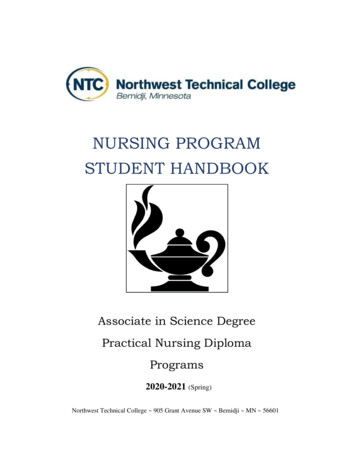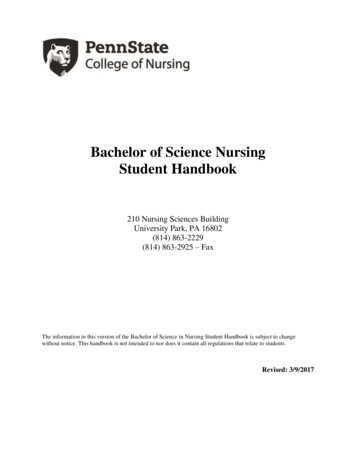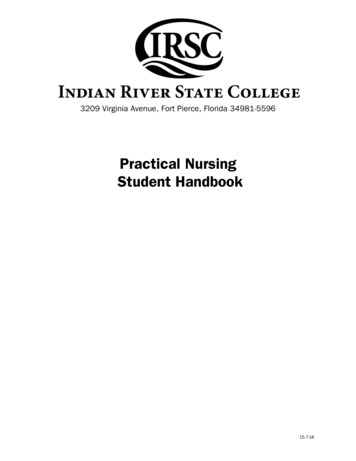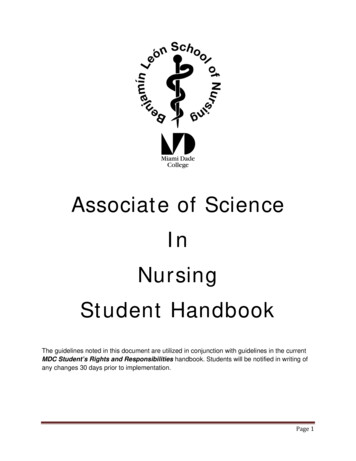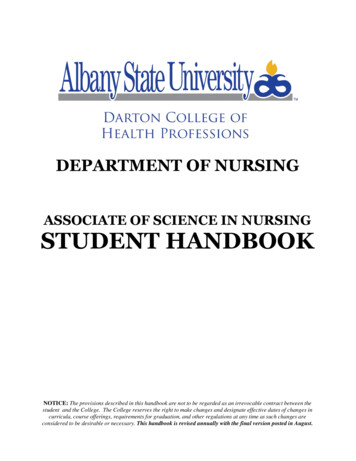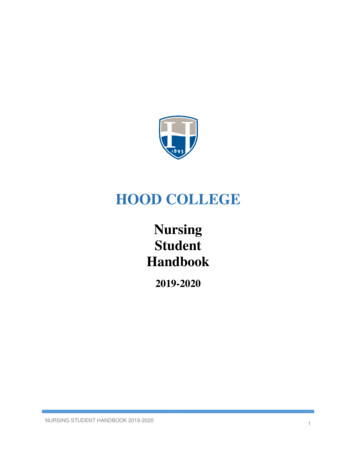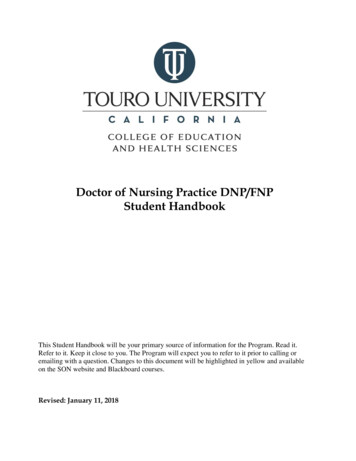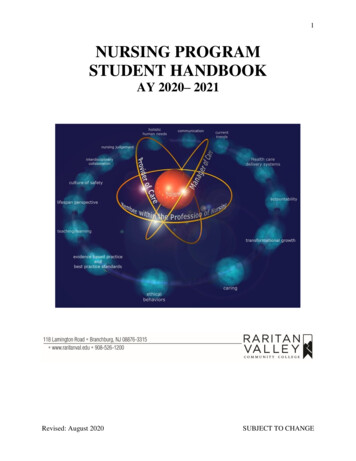
Transcription
1NURSING PROGRAMSTUDENT HANDBOOKAY 2020– 2021Revised: August 2020SUBJECT TO CHANGE
2PREFACEIt is the student’s responsibility to become thoroughly familiar with the RVCC StudentHandbook licies-and-consumerinformation/student-handbook ), the RVCC Catalog ( g ) and the Nursing Program Student Handbook and to comply with theprovisions pertaining to them. The rules and regulations set forth in these college publicationsconstitute students’ rights and responsibilities in the nursing program. This publication is neithera contract nor an offer to make a contract. The Nursing Program Student Handbook contains therigorous requirements for admission and retention that takes precedence over the RVCC GeneralCatalog minimum requirements. Statements in these publications may change at any timewithout prior notice. This publication is reviewed and revised on a yearly basis. The NursingProgram Student Handbook changes become effective the Fall semester following the approvedchange. Students will be notified via RVCC email if there are exceptions to the effective policychange date. This publication contains information valid as of August 1, 2020. For updatedinformation, visit the HSE website at https://www.raritanval.edu/nursing-programs .Revised: August 2020SUBJECT TO CHANGE
3TABLE OF CONTENTSIIIIIIIVVVIVIIVIIIIXXRaritan Valley Community College Mission StatementNursing ProgramA. PhilosophyB. Nursing Program Outcomes and Student Learning OutcomesC. Conceptual FrameworkD. Program of LearningE. Accreditation StatusEducational Competencies for Graduates of Associate DegreeNursing ProgramsCurriculum Plan and OptionsA. Generic Program in Nursing Admission Requirements,Program SequenceB. PNAD Program Admission Requirements and ProgramSequenceC. Advanced Standing OptionsTransfer and Articulation AgreementsA. AAS to BSN Admission Articulation Tract/Kean UniversityB. Transfer and Articulation AgreementsNursing Program Modes of Teaching and LearningA. Teaching and Learning Modalities and ATI testingB. Nursing Simulation Laboratory/Learning LaboratoryC. Clinical ExperiencesNursing Program RequirementsA. Heath Maintenance, Immunization, CHBC and DrugScreening PolicyB. Insurance CoverageC. American Heart Association: CPR and BLS-C CertificationD. Attendance PolicyCourse and Program CompletionA. Required Academic Grade PolicyB. Nursing program Grading SystemC. Clinical Performance Grading PolicyD. Nursing Program Examination PolicyE. RVCC Grade Appeal ProcessF. ATI Predictor ExaminationG. New Jersey Board of Nursing RequirementsReinstatement to the Nursing ProgramA. Nursing Program Exit InterviewB. Requirements for Reinstatement to the Nursing ProgramC. Nursing Program Readmission Appeal ProcessNursing Faculty/Staff Support and CommunicationRevised: August 3438394141414142424545454646464849SUBJECT TO CHANGE
4XIXIIXIIIA. CommunicationB. MessagesC. Faculty and Staff Contact InformationD. Faculty Office HoursE. Department Administrative AssistantF. Complaints and Chain of CommandGeneral Student InformationA. Nursing-Related General Information1. ANA Code of Ethics for Nurses2. Nursing Student Code of Conduct, Academic Integrity3. Nursing Practice Act: 45:1-214. NCLEX-RN Test Plan5. Nursing Social Media PolicyB. RVCC-Related General Student Information1. Academic and Course Calendars2. Final Semester Grade Reports3. ADA Compliance and Disability Services4. RVCC Anti-Discrimination, Anti-Harassment, SafetyReport Policy5. Confidentiality Information (FERPA)6. The Academic Support Center7. Online Services and Educational Support8. Computer Services9. Library Services10. Financial Aid11. Graduationa. Eligibilityb. Expensesc. Degree completion/Letter to BON12. Mental Health Resources13. COVID -19 ResourcesClinical AgenciesAppendicesHow to Get into the Generic RN Nursing Program 2020-2021How to Get into the PNAD RN Nursing Program 2020-2021Verification for Student Health Maintenance Documentation 20202021Health Science Education Department Immunization & NursingProgram Requirements- Health Maintenance Policies, AdamsSafeguard and Sentry MD 2020-2021Nursing Program Readmission Appeal PolicyCriminal History Background Check and Drug Screening For ClinicalPlacementInfluenza Vaccination RecordDrug Testing PolicyRevised: August 6464646464646465676872767886899192SUBJECT TO CHANGE
5Adams SafeguardAcknowledgement of Re-entry ProcessProgram Exit FormATI Usage PolicyAcknowledgement of Nursing Program Student HandbookRevised: August 202094969799100SUBJECT TO CHANGE
6I. RARITAN VALLEY COMMUNITY COLLEGE MISSIONRaritan Valley Community College is a Bi-County College serving the residents of Somerset andHunterdon counties. RVCC is accredited by the Commission on Higher Education, MiddlesStates Association of Colleges and Schools, 3624 Market Street, Philadelphia, PA. 19104, (215)662-5606, www.middlestates.org.MISSION STATEMENTRaritan Valley Community College is an educational community that works to develop criticalthinking, foster intellectual curiosity, promote leadership, encourage social responsibility,support personal growth, and sustain engaged citizenship within a diverse population of studentsand community members. sionVISION STATEMENTRaritan Valley Community College will continue to be a focal point for enriching andbroadening the lives of its stakeholders. Raritan Valley Community College is committed to theimportance of continuous improvement and is recognized throughout the region, state andcountry for its academic excellence. By embracing the concept of the Learning College we willcontinue to empower our students with knowledge, critical thinking skills and the ability tounderstand the present and change the future. We will prepare our students for participation inan increasingly complex global society. The culture of the institution will support professionaldevelopment, institutional integrity, and promote leadership. Commitment to our core valueswill serve as the foundation for our vision.DIVERSITY STATEMENTRaritan Valley Community College values all aspects of diversity including but not limited torace, sexual orientation, religion, age, sex, national origin, disability, socioeconomic status, andpolitical and philosophical perspectives. We rely on diversity to enrich the intellectualenvironment for students and employees. We support educational access and opportunity byrecruiting and retaining a diverse college community. We foster diversity by developing andmaintaining curricular and social programs that infuse the contributions of all people, and bypreparing students to excel in a global society. Our commitment to diversity is reflected in theCollege’s Mission Statement and Strategic Goals, all of which support excellence in teaching,learning and professional development in a welcoming and respectful climateCORE VALUES RVCC is an open admission institution with high standards and excellent supportservices. RVCC serves as an important center for our community. RVCC participates as a reliable partner with the region’s K-12 schools to support activelearning and college readiness. RVCC must provide support for student success, but students are responsible for theirRevised: August 2020SUBJECT TO CHANGE
7 own achievements.The College values the diversity of our communities as a resource that strengthens theinstitution.The College is accountable for the prudent use of all its resources and seeks transparencyin all its operations.The College measures its success against national models and standards.The College commits to environmentally sustainable practices.Educational programs must be affordable.A healthy college community depends on integrity and respect.The best college decisions are made on a learning-centered foundation.Learning is a lifelong endeavor.II. NURSING PROGRAM MISSION STATEMENTThe Raritan Valley Community College Nursing Program prepares the student to function inthree nursing roles – Provider of Care, Manager of Care, and Member of the Profession, whichencompasses knowledge and competence as an entry-level professional nurse, by developingindividualized plans of care based on contemporary research, respect for diversity, professionalinterpersonal skills and technological competency.A. PHILOSOPHYOur Nursing Program philosophy reflects faculty beliefs about humans, health care, nursingeducation, and practice of Associate Degree Nursing graduates.HumansWe believe that humans are multifaceted, diverse, holistic beings who are deserving of caregiven with a spirit of respect and inclusivity. Within this contextual framework, nursing caresupports each individual’s efforts to reclaim or develop new pathways of health and humanflourishing. As members of society, humans are affected by external forces, including but notlimited to, their economic, social, demographic, and political environment.Health CareWe believe that quality health care focuses on holistic health promotion, illness and injuryprevention and, psychosocial support throughout the lifespan. As nurses we facilitate theindividual’s adaptation to changes which occur during growth and developmental stages, oralterations in health status. Our goal as professional nurses is to provide individuals with thecare, knowledge and resources to attain their highest level of function in response to theemotional and physical changes brought about by illness or injury, thus helping them to createfor themselves a new sense of normalcy. This requires that nurses have cognitive, psychomotorand affective domain competencies. Nurses must respond to current societal trends and changesthat affect healthcare delivery systems and the evolving professional role of nurses. They mustalso identify the changes that are needed within the various delivery systems and health caresettings by being active participants in the change process. Using nursing judgment and a spiritof inquiry, nurses interact with other health care team members to identify problems and gatherscientific data relevant to emerging nursing research. This interdisciplinary, collaborative processleads to evidence-based practice, where nurses apply the results of clinical research and bestpractices. Progress will be most productive, when nurses question the status quo, challengeRevised: August 2020SUBJECT TO CHANGE
8assumptions, and promote innovative patterns of problem solving. As change occurs in thehealth care environment, nurses must anticipate the direction of the change and supportinnovative patterns of responding to the needs of patients, families, and the community. Integralto all facets of change is ability to communicate effectively. The ability to therapeuticallycommunicate face-to-face and to utilize technology for communication and documentation isessential to providing quality, patient centered care. From these changes, an improved health caredelivery system will emerge that will benefit everyone including the individual, family andcommunity.Nursing EducationNursing education is a lifelong learning process that results in transformational growth. Thistransformational growth begins with a progressive course of learning activities, designed tofacilitate the development of nursing practice competencies, based on best practice and evidencebased clinical practice standards. The desired outcome of this process is to prepare a safe andcompetent entry level professional nurse who designs care for diverse populations in multiplecare settings.We believe in creating a learning environment that facilitates adult learners to be self-motivated,independent thinkers committed to continuing education both formally and informally. Nurseeducators facilitate the educational process with students by creating an interactive learningenvironment, with students and faculty having specific rights and responsibilities, usingevidence-based pedagogy, technology and clinical resources to support students with variedlearning styles to encourage reflective learning.We believe that effective education is based upon the development of a learning community withall concerned learning from each other through collaboration to advance the acquisition andpractice of quality care delivery. The learning environment is based upon academic integrity,trust, open communication, and honest, accurate feedback in the cognitive, psychomotor, andaffective domains of learning.Practice of the Associate Degree Nursing GraduateTo function effectively in a society and a health care delivery system challenged by rapidchanges, the associate degree nursing graduate must demonstrate cognitive, psychomotor andaffective skill acquisitions in the core components/competencies that characterize the roles of thenurse: provider of care, manager of care, and member within the discipline of nursing. All theseroles incorporate a culture of safety and a philosophy of inclusiveness. These core componentsand competencies are based on (1) Educational Competencies for Graduates of Associate DegreePrograms (National League for Nursing, 2010), (2) NCLEX-RN test plan (2019-2022), (3)Institute of Medicine – Future of Nursing report (2010), and (4) Quality and Safety Education forNurses (QSEN) (2012).In the provider of care role, the associate degree nursing graduate demonstrates accountability byresponding to human needs and factors that contribute to or threaten health, by applying relevanttheories, research, evidence-based guidelines, and principles of teaching and learning within thescope of nursing practice as mandated by the New Jersey Board of Nursing. Nurses providedirect care for individuals and families, recognize community needs and an awareness of local,national and global health needs. Nursing practice embraces the core values of the NationalLeague for Nursing: caring, diversity, excellence, integrity, ethics, holism, and patientcenteredness (NLN Competency Model, 2010, fig 1).As nurses collaborate with professionals from other disciplines, they are uniquely qualified toRevised: August 2020SUBJECT TO CHANGE
9make critical decisions and assist individuals to meet their changing needs across the lifespan.As a manager and coordinator of care the associate degree nursing graduate provides for thehealth care needs of individuals and groups through direct or delegated care. In this role it isessential that the graduate utilize effective, respectful communication skills, and use appropriatechannels of communication within the inter-disciplinary organizational system.In the role as a member within the discipline of nursing, the associate degree nursing graduateprovides evidence of a personal and professional commitment to life-long learning, professionalself-awareness, and supports empowerment of nurses as integral members of the health caresystem. Nurses encourage social responsibility and sustained engaged citizenship, through theircommitment to caring, advocacy, positive social change, ethical behaviors based on the ANACode of Ethics for Nurses to deliver competent nursing care for diverse populations.B. NURSING PROGRAM OUTCOMES AND STUDENT LEARNING OUTCOMESNursing Program Outcomes:The nursing program of Raritan Valley Community College exists to:1. Promote educational excellence as evidenced by:a. Maintaining a Nursing Program graduation rate of 70% for students entering thefour semesters of clinical nursing courses.b. Meeting or exceeding the national pass rate by first time test takers on theNational Council Licensure Examination (NCLEX-RN) for associate degreeprograms as reported by the National Council of State Boards of Nursing(NCSBN).c. Reported satisfaction with the program of learning by nursing graduates at a rateof 90% on the graduate survey.2. Meet the health care needs of the community by providing entry level nurses asevidenced by:a. Achieving a 70% job placement rate as a Professional Registered Nurse withinone year of licensure.b. Recognizing the need for life-long learning, nursing graduates will report on thegraduate survey a 50% possibility of pursuing a baccalaureate degree in nursingwith 5 years after graduation.Student Learning Outcomes:1. The student will function as providers of care when they:1.1. Integrate holistic human needs in providing safe nursing carewhile encouraging human flourishing of diverse patients infamilies and communities. (GE- NJ 1, 3, 8)1.2. Use nursing judgment to assess patient situations and performclinical decision making. (GE - NJ 1, 2, 3, *)1.3. Collaborate appropriately and effectively withinterdisciplinary members of the health care team. (GE- NJ1, 4)Revised: August 2020SUBJECT TO CHANGE
101.4. Construct therapeutic interventions within a culture of safetyusing the nursing process. (GE- NJ 2, 3, 4, ER, *)1.5. Integrate principles of growth and development with a lifespanperspective. (GE- NJ 3, 5, 8)1.6. Utilize teaching/learning principles to improve outcomes whencaring for patient at different levels of wellness. (GE- NJ 1,3)1.7. Utilize evidence based practice/best practice standards whenplanning and delivering nursing care. (GE- NJ 2, 3, 5, ER,*)2. The student will function as managers of care when they:2.1. Demonstrate leadership and management by employingstrategies that adapt to different health care deliverysystems (GE- NJ 1, 8, ER, *)2.2. Apply concepts of current trends, including information technology,when planning and delivering nursing care. (GE- NJ 4, IL)2.3. Utilize communication effectively to meet the health careneeds of diverse populations. (GE- NJ 1, 2, 3, 4, 8, ER,IL,*)3. The student will function as members within the profession of nursingwhen they:3.1. Incorporate ethical behaviors based on the ANA Code ofEthics for Nurses when providing care. (GE- NJ ER)3.2. Implement behaviors which embrace the values of caring,integrity, and inclusiveness. (GE- NJ 5, 8, ER)3.3. Engage in activities for professional development,transformational growth, and life-long learning. (GE-NJ 3,4, 5, 8, IL)3.4. Demonstrate accountability by following the ethical/legalguidelines for professional practice in accordance with theRules and Regulations of the New Jersey Board of Nursing.(GE- NJ IL, ER,*)*embedded critical thinkingC. CONCEPTUAL FRAMEWORK OF THE PROGRAMThe conceptual framework of the program is based on the central themes of holism, caring, andinclusiveness; with the core concepts of the role of the nurse as provider of care, manager of careand member with the profession of nursing providing the functional processes for nursingpractice. There are 14 core competencies which are integrated throughout the curriculum: Provider of CareRevised: August 2020SUBJECT TO CHANGE
11 1. Holistic human needs2. Nursing judgment3. Interdisciplinary collaboration4. Culture of safety5. Lifespan perspective6. Teaching/learning7. Evidence based practice/best practice standardsManager of Care8. Health care delivery systems9. Current trends10. CommunicationMember within the Profession of Nursing11. Ethical behaviors12. Caring13. Transformational growth14. AccountabilityD. PROGRAM OF LEARNINGThe program of learning is developed, evaluated and revised through continuous and on-goingprogram evaluation during Departmental and Course Team Meetings. In addition, courseevaluations by students and clinical facility evaluations by students and faculty are used as partof the program evaluation and revision process. Program assessment is also accomplishedthrough assessment of outcomes. At the end of each academic year, two full day CurriculumMeetings, attended by all nursing faculty, are scheduled to evaluate the program of learning.Based on a review of the findings from the evaluation methods and an assessment of programoutcomes and learning objectives, changes in the program
A. AAS to BSN Admission Articulation Tract/Kean University 25 . VI Nursing Program Modes of Teaching and Learning 25 A. Teaching and Learning Modalities and ATI testing 26 B. Nursing Simulation Laboratory/Learning Laboratory 28 C. Cl
